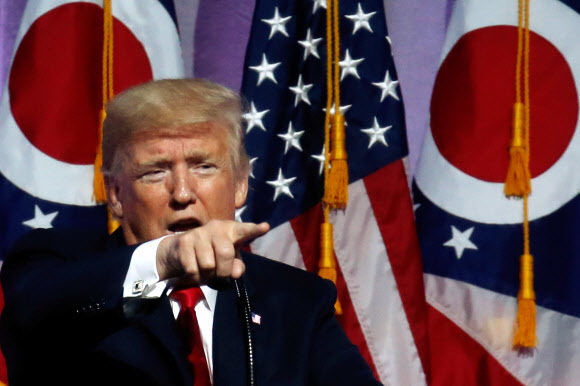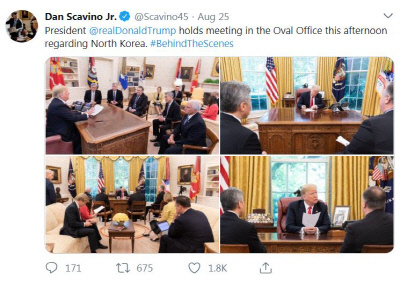 |
|
US President Donald Trump gives a speech during the 2018 Ohio Republican Party State Dinner in Columbus, Ohio on Aug. 24. (Reuters)
|
Experts say Trump cancelled visit out of fear it would produce no results
US President Donald Trump’s abrupt cancellation of US Secretary of State Mike Pompeo’s visit to North Korea, scheduled for the end of August, has once again plunged the timeframe for the denuclearization of the Korean Peninsula into uncertainty. Since Trump has put a halt to Pompeo’s planned trip to Pyongyang on the grounds of North Korea’s inadequate denuclearization and China’s uncooperativeness, Korean Peninsula affairs are expected to grind to a halt, short of some major development. On the verge of a protracted stalemate, South and North Korea as well as other powers in the region find themselves forced once again to seek a turnaround. The prevailing view is that Trump’s cancellation of Pompeo’s plan to visit North Korea on Aug. 24, just one day after the plan’s announcement, was motivated by his concerns that Pompeo might return empty-handed. The announcement of Pompeo’s fourth trip to North Korea had raised hopes that Pyongyang and Washington would reach some kind of agreement, even if only a minor one, about trading a list of nuclear weapons and facilities for an end-of-war declaration. Even though Trump had recently made the hopeful remark that he believed North Korea had taken steps toward denuclearization, it appears that he didn’t end up getting a satisfactory response from North Korea about Pompeo’s visit there. “I don’t think they discussed the details of how North Korea would disclose its nuclear facilities,” said Koo Kab-woo, professor at the University of North Korean Studies. Evans Revere, who formerly served as the US State Department’s acting assistant secretary of state for East Asian and Pacific Affairs, told the Voice of America that Trump probably concluded that North Korea was unlikely to be more positive or cooperative about denuclearization and that he appeared to have decided it would be better to avoid embarrassment or failure by canceling Pompeo’s visit. Another possible motivation is that Trump was attempting to minimize his problems, given the current domestic pressure over the Russia scandal. It’s especially notable that Trump took aim at China in a tweet: “Additionally, because of our much tougher [t]rading stance with China, I do not believe they are helping with the process of denuclearization as they once were.” “Secretary Pompeo looks forward to going to North Korea in the near future, most likely after our [t]rading relationship with China is resolved,” Trump also wrote. Additional complications from US-China battle for influence The Korean Peninsula issue is being complicated by Trump’s addition of China-bashing related to the US and China’s hegemonic struggle. It has not been disclosed what changed during the day between Pompeo’s announcement of his plan to visit North Korea and Trump’s cancellation of that plan. The White House said that Trump’s decision was made in consultation with his key advisors. On the afternoon of Aug. 24, the day that Trump cancelled Pompeo’s trip, White House Director of Social Media Dan Scavino tweeted four photos of Trump holding what he described as a “meeting in the Oval Office this afternoon regarding North Korea.” The photo shows several figures sitting in front of Trump, including Pompeo, Vice President Mike Pence and Stephen Biegun, who was recently appointed US Special Representative for North Korea Policy. Also present were US Ambassador to the Philippines Sung Kim, who took part in the North Korea-US working-level talks at Panmunjom, and Andrew Kim, head of the CIA’s Korea Mission Center. National Security Advisor John Bolton, a leading hawk, also participated in the meeting on speaker phone, since he was traveling overseas, the foreign press reported. The White House said that Pompeo was present when Trump was posting on Twitter, underlining that this decision represents the resolute position of the US administration. “Trump’s tweets make clear that the US won’t play ball if North Korea doesn’t make some forward-looking changes [toward denuclearization],” said Cho Sung-ryul, senior research fellow for the Institute for National Security Strategy. This deflates the scenario posited by some foreign policy pundits of an end-of-war declaration in September, a scenario that was predicated on the success of Pompeo’s trip to the North. If anything, this is likely to further sour US-China relations given Trump’s attempt to blame China for the lack of progress on North Korea’s denuclearization. China struck back forcefully on Aug. 26, with Foreign Ministry Spokesperson Lu Kang describing the American claims as being irresponsible, as well as contrary to basic facts. The cancellation of Pompeo’s trip places considerable strain on inter-Korean relations, too. While the Unification Minister said it will open the inter-Korean liaison office in Kaesong this week as planned, Seoul finds itself unable to ignore direct and indirect appeals from the US to take things slow. The cancellation will probably also have a negative impact on the third summit between South Korean President Moon Jae-in and North Korean leader Kim Jong-un, which is scheduled for September.
 |
|
Photos of Trump in an Oval Office meeting regarding North Korea posted on Twitter by US White House Director of Social Media Dan Scavino on Aug. 25.
|







